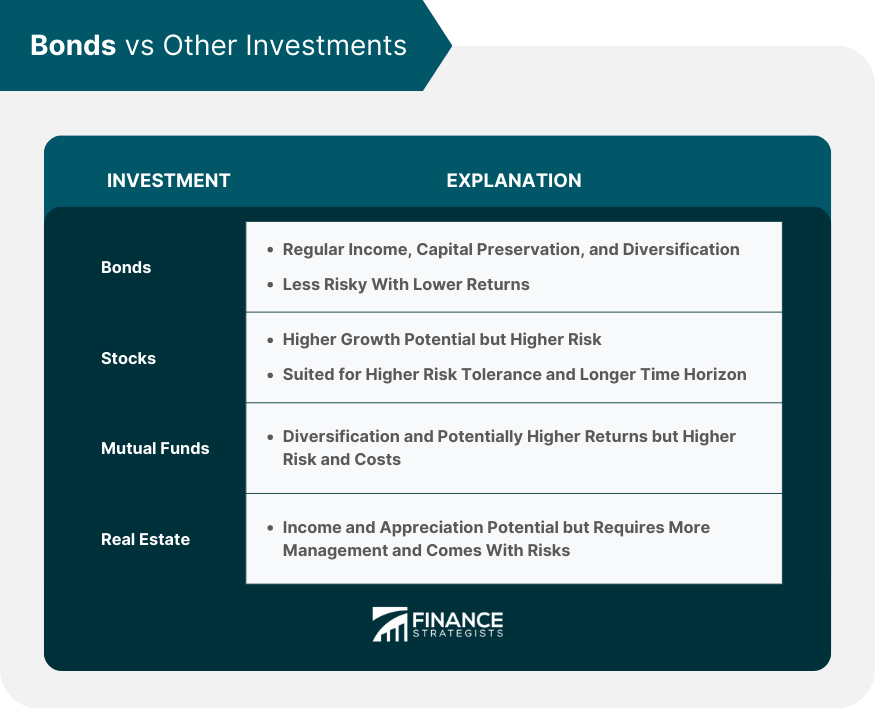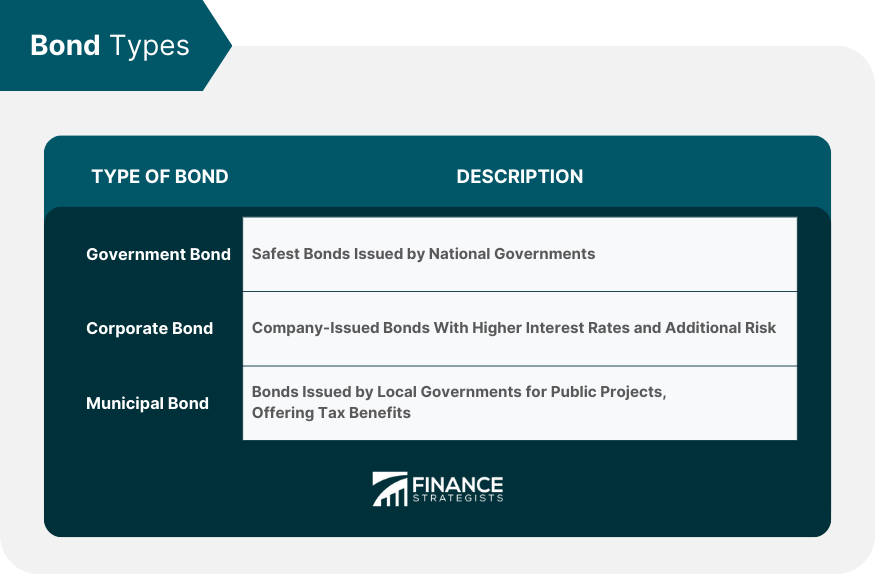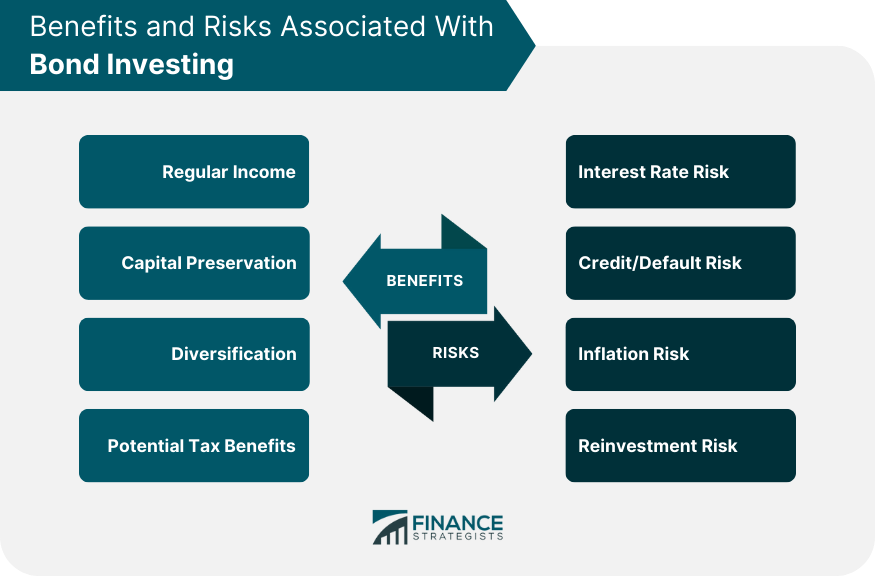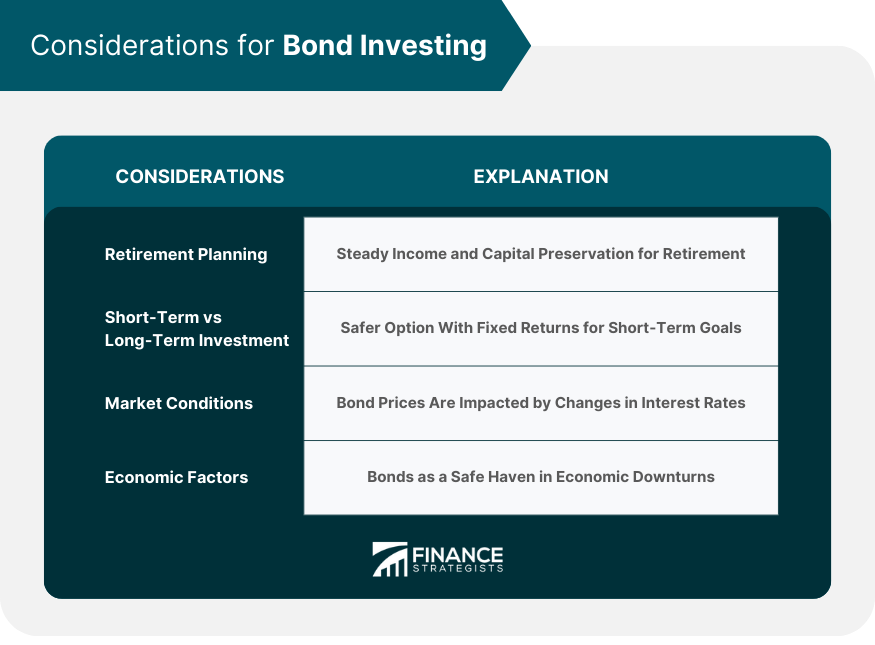Bonds can be a good investment depending on your financial goals and risk tolerance. They are generally considered to be lower risk compared to other investment assets like stocks, and they provide a regular income stream, which can be especially appealing to those needing reliable income such as retirees. Bonds also offer the benefit of capital preservation. This makes bonds a relatively safe choice for those who wish to safeguard their initial investment. Diversification is another benefit as they can stabilize your portfolio during times when the stock market is volatile. However, investing in bonds isn't without its risks. These include interest rate risk, credit/default risk, inflation risk, and reinvestment risk. While bonds are generally considered less risky than stocks, they also typically offer lower returns. Stocks have the potential for higher growth and are better suited for investors with a higher risk tolerance and a longer time horizon. Mutual funds can offer diversification benefits and potentially higher returns, but they also come with higher risk and costs. On the other hand, bonds are simpler, provide steady income, and are less risky. Real estate can provide both income (in the form of rent) and potential capital appreciation. However, it also comes with risks and requires more management compared to bonds. Bonds, being more passive, can provide regular income with less hassle. Bonds are financial instruments, essentially loans, made by investors to borrowers, typically corporations or government entities. As a type of investment, the goal of a bond is to generate income or profit. There are various types of bonds, including government, corporate, and municipal bonds. Government bonds, issued by national governments, are generally the safest as they are backed by the government. Corporate bonds are debt securities issued by companies and typically offer higher interest rates due to the additional risk involved. Municipal bonds, issued by local governmental entities, are utilized to finance public projects and often provide tax advantages for investors. A bond operates through regular interest payments, also known as coupons, which are set at the time of issuance and remain constant throughout the life of the bond. The face value, which is the amount to be paid back to the investor at the bond's maturity, and the maturity date, the deadline for this repayment, are other key elements of a bond. While bonds are generally less risky than stocks, they still carry potential risks. These include default risk, interest rate risk, and inflation risk. Despite these risks, bonds provide a predictable return and are a common component in a diversified investment portfolio. One of the main advantages of bonds is that they provide a steady stream of income. This makes them particularly appealing to retirees and others who require a reliable income. When it comes to preserving capital, bonds are a top choice. Unlike stocks, where your principal can be at risk, the face value of a bond is returned to you at maturity (assuming no default). This makes bonds a relatively safe investment for those looking to preserve their initial investment. Adding bonds to your portfolio can provide diversification benefits. Because bonds tend to perform well when stocks are performing poorly, they can help stabilize your portfolio during periods of stock market volatility. Certain types of bonds, like municipal bonds, offer tax benefits. The interest income from these bonds is often exempt from federal income tax and sometimes state and local taxes as well. This can make municipal bonds particularly attractive to investors in high tax brackets. Interest rate risk refers to the potential for investment losses that arise from changes in interest rates. When interest rates rise, the prices of existing bonds fall since new bonds are issued with higher coupon rates. This can be a significant concern for bond investors who need to sell their bonds before maturity. Credit risk or default risk refers to the possibility that the issuer of the bond may not be able to make timely interest payments or repay the principal at maturity. While this is rare with government bonds, it can be a concern with corporate and municipal bonds. Inflation risk is the risk that the purchasing power of the fixed interest payments from a bond will be eroded over time due to inflation. This is particularly a concern for long-term bond investors, as inflation can have a more significant impact over longer periods. Reinvestment risk is the risk that the investor may not be able to reinvest the interest income from a bond at a rate comparable to the bond’s original yield. This can be a problem when interest rates are falling. For those in retirement or nearing retirement, bonds can provide a steady stream of income and preserve capital, which is critical at this stage of life. For short-term goals, bonds can be a safer option as they promise a fixed return. For long-term goals, other assets like stocks may offer higher returns but come with more volatility. Changes in interest rates significantly impact bond prices. When interest rates rise, bond prices fall, and vice versa. In a growing economy, other investments like stocks might provide higher returns. In contrast, during economic downturns, bonds are typically seen as a safe haven. A well-diversified portfolio often includes a mix of different asset classes, including bonds. Bonds can provide stability and income, balancing out the volatility of stocks. The decision of whether bonds are a good investment depends on factors such as financial goals and risk tolerance. Bonds offer regular income, capital preservation, and diversification, making them appealing to those seeking stable returns. However, bonds also carry risks like interest rates, credit/default, inflation, and reinvestment risks. Comparing them to other options, bonds have lower returns but lower risk compared to stocks, mutual funds, and real estate. Understanding different types of bonds and considering market conditions and personal goals is important. Investing in bonds requires careful consideration, and professional wealth management can provide guidance to optimize investment strategy.Are Bonds a Good Investment?
Evaluating Whether Bonds are a Good Investment
Comparing Bonds With Other Investments
Bonds vs Stocks
Bonds vs Mutual Funds
Bonds vs Real Estate

Overview of Bonds

Benefits of Investing in Bonds
Regular Income
Capital Preservation
Diversification
Potential Tax Benefits
Risks Associated with Bond Investments
Interest Rate Risk
Credit/Default Risk
Inflation Risk
Reinvestment Risk

Consideration of Personal Financial Goals and Risk Tolerance
Retirement Planning
Short-Term vs Long-Term Investment
Market Conditions and Economic Factors
Impact of Interest Rates
State of the Economy
Role of Bonds in a Balanced Investment Portfolio

Bottom Line
Are Bonds a Good Investment? FAQs
Bonds are generally considered safer than stocks, but they still carry risks, including interest rate risk, credit risk, and inflation risk.
Yes, bonds can provide a steady income stream and capital preservation, making them suitable for retirement portfolios.
Yes, you can lose money on bonds if the issuer defaults or if you sell a bond for less than you paid before it matures, particularly when interest rates are rising.
When interest rates rise, bond prices fall, and vice versa. This is because as interest rates increase, new bonds are issued with higher coupon rates, making existing bonds less attractive.
It depends on your investment goals and risk tolerance. Bonds are typically less risky and provide steady income, while stocks have the potential for higher returns but with greater volatility.
True Tamplin is a published author, public speaker, CEO of UpDigital, and founder of Finance Strategists.
True is a Certified Educator in Personal Finance (CEPF®), author of The Handy Financial Ratios Guide, a member of the Society for Advancing Business Editing and Writing, contributes to his financial education site, Finance Strategists, and has spoken to various financial communities such as the CFA Institute, as well as university students like his Alma mater, Biola University, where he received a bachelor of science in business and data analytics.
To learn more about True, visit his personal website or view his author profiles on Amazon, Nasdaq and Forbes.















